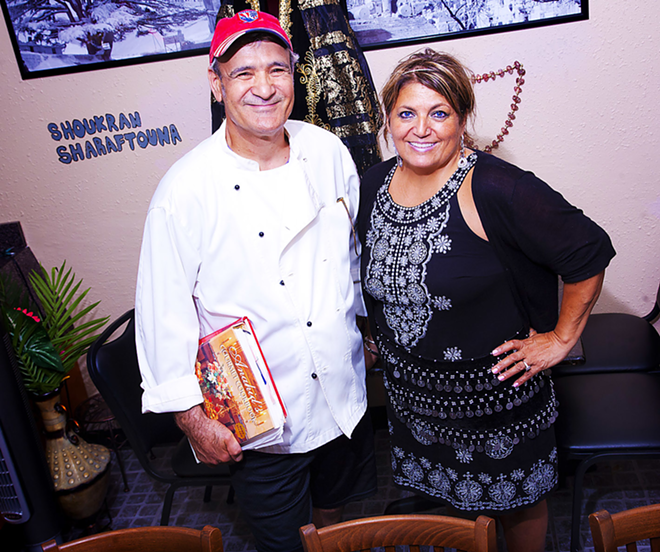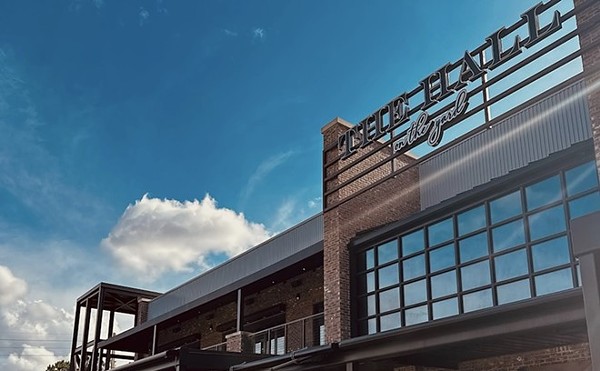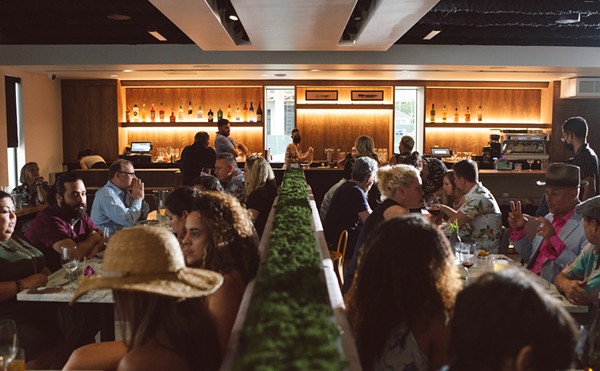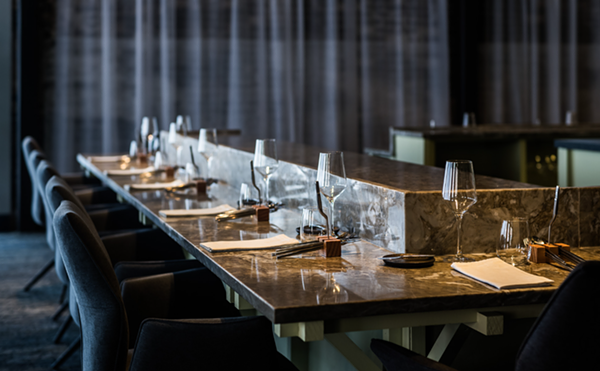The love between Hana Lakkis and Fisal Houssein, owners of Beirut Café in St. Petersburg, is something out of a novel. Fisal is Syrian, Hana Lebanese. Fisal was in the Syrian army, though his family is Kurdish, from Turkey originally. In Syria, every man over the age of 18 has to serve in the army. They met when his army unit was occupying her family’s village.
“We are enemies opposed to one another,” Fisal said.
It wasn’t just the war between their countries, but also their faiths.
“I am Muslim and she is Christian,” Fisal said.
Hana had been living in America before, but returned to Lebanon at her mother’s urging. Fisal heard rumors about a new girl from America coming to the village. Hana’s grandparents sold meat, yogurt and milk from their farm. Soldiers would stop by regularly to buy goods from them.
The first time she met Fisal, he was 24 and she was 22. He came with his captain and a few others to her grandparents’ home. Civilians had to allow Syrians into their home, if asked.
“Because of the war, no home could say no to them,” Hana said. Hana hints that often soldiers would abuse their authority, forcing themselves on women, and being generally rude.
“It was uncomfortable because I didn’t want to be the enemy,” Fisal said.
Hana liked him almost immediately.
“Fisal wasn’t like the others,” Hana said with a smile. “He was genuine and kind.”
The next time she saw him was in the town’s only general store and gathering place.
“He pulled up hanging off the side of the army truck,” Hana said. “He told the clerk to give me all the ice cream I want because he is paying for it.”
One night, Hana was coming home from visiting family on the other side of the village. It was late as she walked into the town’s square; no light showed on the street.
She saw a figure moving toward her, a Syrian soldier; he extended a handshake to her and then attacked her. Suddenly, gunshots fired nearby, and the soldier ran away. Hana stood in the street, shaking in the moonlight.
“Out of the darkness I hear this, ‘Psst … psst,’” Hana said. “It was Fisal.”
It wasn’t long before Hana’s mother heard that her daughter had been seen with a Syrian soldier.
“Her mother came here to bring her back,” Fisal said.
Her mother hadn’t been back to Lebanon since the Syrian army had killed her brother, Hana’s uncle, in front of his family. After attending a cousin’s wedding with Fisal and her mother, Hana was told to pack her things.
“My mother told me I was flying home to America in the morning,” Hana said. “I didn’t want to leave Fisal.”
Fisal told her to grab her things and meet him outside. They fled into the night. Before she knew it, they were at the border of Syria, and Fisal was being asked for his crossing papers.
“He didn’t have permission to leave Lebanon,” Hana said. “They asked who I was and he said I was his fiancée.”
The Syrians arrested them both and put them in jail, separately, for three days. Fisal was accused of kidnapping an American girl (Hana was an American citizen staying in Lebanon) and Hana needed to prove she was a virgin.
“My mother told me that there were places in the world where they treated women like this,” Hana said. “I never believed her until I was there.”
After it was confirmed she was a virgin and Fisal had not kidnapped her, Syria sent Hana to live with Fisal’s family. Fisal was sent back to Lebanon to face punishment for leaving without permission, and finish his time in the army. Their wedding in Syria lasted three days. But Syria wasn’t kind to the Americanized Hana. There was little food and Fisal’s family even attempted to have her killed at one point. The pair fled again, and again.
Finally, they secured papers for Fisal to come to America. Again they fled in the night, switching cars constantly, making it to the airport and finally America.
Fisal and Hana lived in Pennsylvania for 20 years, making pita bread and baked goods with Hana’s family. Fisal worked at an insulation factory for two decades before the factory closed in 2010. Hana had family in New Port Richey, so they moved south. They opened Beirut Café two years ago on Park Street, just south of 54th Avenue North. The café is sandwiched between a Thai restaurant and Carmelita’s, right next to a biker shop.
It’s just the two of them, and business is steady but slow. The menu is small but packed with traditional Middle Eastern dishes like kibbee b’sayneyeh (baked ground beef with bulghur wheat, onions, spices and pine nuts).
“The roots trace back to Turkey, where my family is from,” he said. “But it’s Lebanese and Syrian, too.”
We ordered the kibbee b’sayneyeh with tabouleh, hummus and warm pita bread. The tabouleh was bright and fresh, filled with the flavors of parsley, tomatoes, onions, olive oil, lemon and mint.
“I chop everything by hand,” Hana said. “If you make ahead of time, it just doesn’t taste the same.”
Kibbee is like a Middle Eastern meatloaf, but it’s filled with aromatic flavors. Our hummus mound, served with roasted red peppers, tastes like fresh lemons. Next is the crispy falafel with warm tahini sauce and babaghanouj. The spiced chickpea and fava bean patties are crispy on the outside, submitting to delicate softness inside. The babaghanouj is made from roasted eggplant puree with tahini sauce. Hana brought out fresh yogurt for dipping, the first serving of the batch.
For dessert, Hana insisted we try her special baklawa cheesecake. A rustic crust of nuts, wrapped around not-too-sweet cheesecake, drizzled with homemade rosewater syrup, still warm. It was divine.
The words “ya ahla” are painted on the wall inside.
“It’s pronounced yah-ahh-la,” Fisal said. “It means welcome.”
Beirut Café’s menu marries flavors from three countries still caught in the crossfire of war. It's a story of territories conquered, battles lost. But it’s also a story of love, infused into every bite, making life — and the food on the table — just that much sweeter.
















